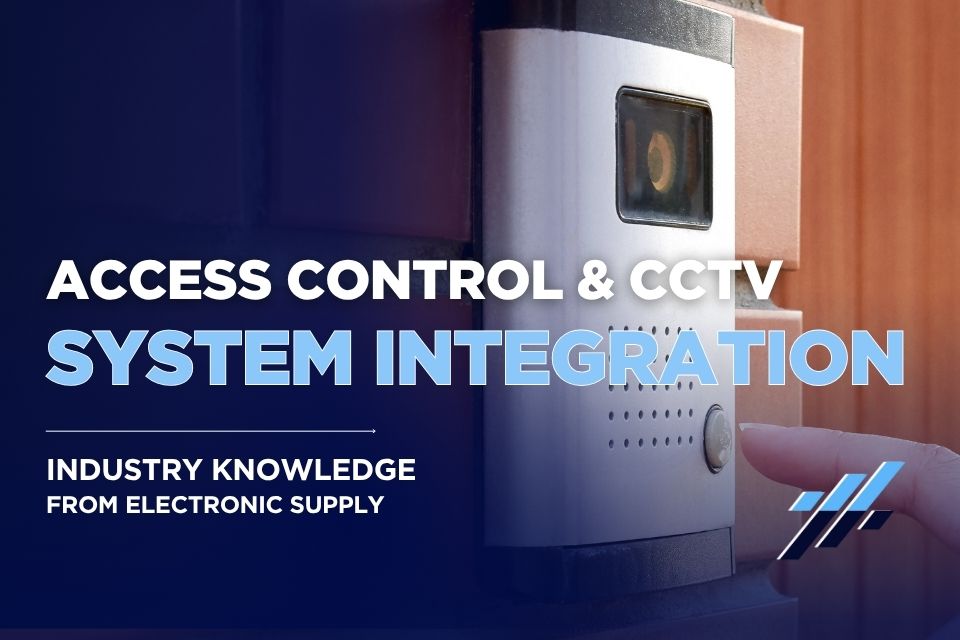Managing security today isn’t just about locking doors and installing cameras; it’s about creating a unified system that actively prevents threats and protects assets. If you’re responsible for safeguarding a facility, you’ve likely experienced gaps in surveillance, delayed response times, or a lack of visibility into who is accessing sensitive areas. These challenges can compromise your entire operation and leave critical vulnerabilities exposed.
Fortunately, integrating access control and video surveillance offers a smarter, more proactive solution. This article outlines how to implement these technologies together for stronger, more efficient security. As a trusted low voltage distributor since 1952, Electronic Supply provides expert support, advanced access control systems, and video surveillance systems from leading brands to help you get it right from the start.
Understanding Access Control and Surveillance Systems
What is Access Control?
Access control systems regulate who can enter or exit specific areas. These systems are critical for preventing unauthorized access and protecting sensitive zones.
Definition and Purpose
Access control is a security method that restricts entry to buildings, rooms, or resources based on authentication credentials. These credentials may include physical devices or biometric information.
Types of Access Control Methods
- Keycards and Fobs
- Biometric Scanners (fingerprint, facial recognition)
- PIN Codes
- Mobile Credentials
Importance in Security Management
By logging access control events and enforcing entry rules, access control systems provide a foundational layer of physical access control and accountability within modern security systems.
What is Surveillance?
Surveillance systems capture video footage of environments to monitor behavior, deter crime, and provide visual evidence.
Definition and Purpose
Video surveillance involves the use of cameras to observe an area, recording footage for real-time or post-event review. It is often paired with motion detection technology to enhance coverage.
Types of Surveillance Technologies
- Analog CCTV
- IP Cameras
- Cloud-Based Systems
Role in Crime Prevention
Surveillance deters vandalism and theft, helps investigate incidents, and supports law enforcement with video evidence. Video surveillance systems are essential for both prevention and post-event analysis.
The Importance of Integration
Benefits of Integrating Access Control and Surveillance
Enhanced Situational Awareness
Real-time video linked to access control events provides security teams with a full picture of who accessed where, when, and how. This integration of access control video creates actionable intelligence.
Improved Incident Response
When access control triggers video surveillance, teams can verify identities and respond to unauthorized access more effectively. This integration enhances response time and precision.
Streamlined Operations
Centralized management of systems reduces complexity and ensures faster decision-making. Integrated access control simplifies monitoring and strengthens physical security.
Key Integration Techniques
Centralized Management Software
Utilize software that consolidates access control systems and video surveillance into a unified dashboard. This streamlines control integration and improves operational efficiency.
Event-Triggered Surveillance Activation
Configure systems to activate surveillance or send alerts based on specific access control events. This can include after-hours entries, forced access, or motion detection.
Ensuring System Compatibility
Choose vendors that support open standards and seamless integration between access control video surveillance and other security solutions. Compatibility with platforms like Amazon Web Services (AWS) can enhance scalability.
Best Practices for Implementation
Assessing Security Needs
Conduct a Security Audit
Analyze existing systems and identify critical gaps in your physical security. Determine where access control security cameras and surveillance coverage are most needed.
Set Integration Objectives
Establish goals such as preventing unauthorized access, improving incident resolution, or enhancing data analytics through access control integration.
Choosing the Right Technology
Evaluate System Options
Compare access control solutions and video surveillance technologies based on their features, flexibility, and vendor support.
Consider Future-Proofing
Select technologies that allow for expansion and integrate smoothly with emerging solutions in surveillance integration.
Vendor Support Matters
Reliable vendor support ensures system updates and long-term performance. Work with suppliers like Electronic Supply who offer top-tier brands and knowledgeable service.
Training and Maintenance
Train Your Team
Provide thorough training on how to manage integrated access control and video systems. Understanding how to interpret access control events and review footage is critical.
Schedule Regular Maintenance
Keep your system optimized with regular checks, software updates, and hardware inspections.
Develop a Response Plan
Document protocols for handling various access control and surveillance scenarios, ensuring quick and effective response.
The Future of Security Integration
Emerging Trends
Advanced access control systems are now incorporating AI-driven analytics, smart cameras, and real-time data dashboards. These features support enhanced automation and efficiency.
Role of AI and Machine Learning
AI technologies are transforming security systems by enabling real-time facial recognition, behavioral analysis, and automated alerts. Machine learning can detect anomalies and improve system performance over time.
Get Expert Help with Your Security Integration
Access control and video surveillance work better together, but only when implemented with the right technology and expertise. Visit Electronic Supply’s Lenexa facility or call us at 816-931-0250 to speak with our knowledgeable staff. Whether you’re planning a new project or upgrading an existing system, our experts will help you select and deploy access control solutions that deliver long-term value.


